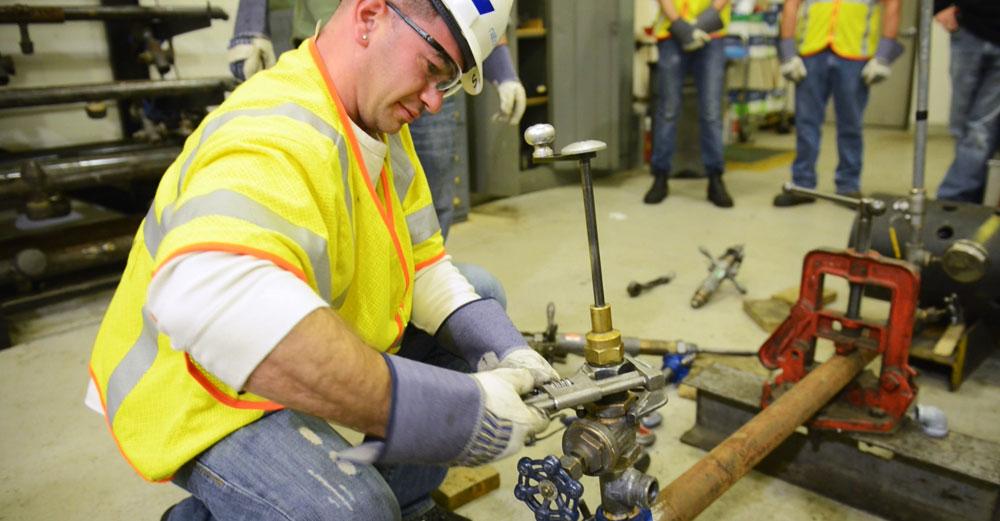
How would you like to take a 12-week, 90-hour training program and be hired practically the minute after you’ve been handed your certificate? That’s kind of how the Farmingdale State College partnership with international energy provider National Grid has worked – much to the delight of the students who have completed the course.
Of course, it’s a little more complicated than that, but not much.
The tough part is getting into the National Gas Technician Certificate Program, because you have to be certified by your doctor as fit for the physically demanding work; take an aptitude test; and then a pre-entry physical assessment. Get through all that and you’re in the program – a partnership that has recently completed a Round One rollout at National Grid’s Melville, Long Island headquarters.
Farmingdale – through its Renewable Energy and Sustainability Center (RESC) – developed and oversees the curriculum, and National Grid provides the classroom and hands-on learning space for this first-in-the-industry initiative. It has been such a success – all 12 students in the first class have been hired by National Grid – that it will now be replicated at other SUNY schools, beginning with Hudson Valley Community College this spring. Likewise, National Grid wants to roll it out throughout its northeast territory.
“The partnership between Farmingdale State College and National Grid is exactly the kind of relationship higher education and industry must forge – for the benefit of students, the industries that drive our economy, our academic institutions, and the communities in which we live,” says Farmingdale President John S. Nader. “This is a model that is already paying dividends, with these students now in well-paying jobs and National Grid enjoying an influx of highly motivated, expertly trained employees.”
“SUNY and National Grid are totally committed to the concept of applied learning,” Chancellor Nancy Zimpher said at a recent ‘coming-out party’ for a formal SUNY-National Grid partnership. “Academic instruction folded together with hands-on workforce experience and on-the-job training is invaluable. Programs like this couldn’t be more necessary today.
“Higher education is diversifying. We’re evolving. And when we can evolve together with an employer to meet a specific industry need, we’ve all done our jobs.”
It was Carey Hatch, SUNY’s Associate Provost for Academic Technologies and Information Systems – following an October 2014 meeting of SUNY and National Grid heavyweights – who recommended that Farmingdale be the first SUNY campus to engage with the energy provider.
“SUNY wanted a state-level industry partner that could showcase our unique ability to deliver educational opportunities to individuals in support of an industry, and state economic need. Chancellor Zimpher had pointed our university system toward providing applied learning opportunities en masse, and National Grid was an ideal partner. I think National Grid saw the value in having an education partner to help meet their workforce needs.
“We pointed National Grid to a campus we knew would be a good partner. Farmingdale has a long history of workforce development and industry partnerships. Farmingdale is also a recognized leader in energy and sustainability. We were confident that Farmingdale could deliver what National Grid was looking for.”
What kind of need was being met?
What National Grid was looking for, and what Farmingdale could deliver, took two years of hard work, research and lobbying to bring the certificate program to fruition. Most of the responsibility fell to Brian Varga, at the time National Grid’s learning and development point person, and Farmingdale’s Marj Issapour, Director of the RESC.
“We wanted to come up with something that was unique, and beneficial to Farmingdale’s local and regional constituents,” says Professor Issapour. “In addition, it had the potential to serve as a model program to be replicated by National Grid throughout their reach, and by other industries in our region.
“Then there were issues such as insurance, liability, instructor contracts and compensation, as well as flyers, branding, and other things that had to be discussed and decided upon. We knew this was a program worth insisting on.”

The 12 graduates of the program (another 12 are in training right now) are grateful they did. Robert McDermott was looking for a career change when he learned about the program through a family member. From what he read in National Grid’s brochure, it seemed like a perfect fit.
“I was pretty miserable at my job as a coder and desperately needed a change. Physical, outdoor work seemed like a much better fit for my personality, rather than my desk job. I wanted to get a taste of what it would be like to work in the gas industry, and to see if I liked doing it enough to make a career of it.”
Now, with only a few months on the job, McDermott is not only happy with his job, he is recommending it to others as well.
“For anyone considering a job in the field, if you aren’t afraid to get dirty, wake up early, and are in decent shape, this is a great opportunity. I don’t regret making this decision one bit.”
Sean Caspar, one of McDermott’s classmates, learned about the program from a National Grid email. He had already submitted a resume for a job, and was waiting to hear back when the company reached out.
“I have always been amazed at the engineering and layout of utilities distribution. I also wanted to be part of a company I can grow with, too.”
Varga, currently National Grid’s Director of Gas Field Operations for Long Island and the person responsible for hiring, says that with an aging workforce that needs replenishing, the program will be the preferred pipeline for new employees.
The future of the program
The program, which is taught at National Grid’s Long Island training center, has several components. Beyond an introduction to the gas industry, it exposes students to the job tasks, work methods and safety practices utilized by various workforce positions in gas construction, maintenance, and customer service. The following video gives you a taste of what the students experienced.
“We’re very proud of this one-of-a-kind program and our partnership with SUNY and Farmingdale State College,” said National Grid New York President Ken Daly. “Bringing these students on board helps National Grid, the natural gas industry, and the Long Island economy. We look forward to the graduates providing the foundation for a safer, more reliable natural gas network that continues to grow.”
Farmingdale has already seen success in the program, as has National Grid. Seeing that, there is already a commitment to expand these opportunities to other SUNY campuses in the future. The program will be replicated at SUNY colleges and universities throughout the state, beginning with Hudson Valley Community College in Spring 2017. Students across New York will continue to have the opportunity to share a learning experience and prepare themselves for the clean energy workforce needs of the future.




I’m interested! Sounds like this might be a good fit for me ..
Thats cool!
indeed!